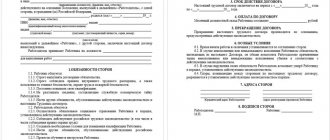Organizations are no longer required to have round seals: let's look into the details
Several years ago, legislation required organizations to have round seals indicating their name and location. But in April 2015, Federal Law No. 82-FZ dated 04/06/15 came into force, which removed such an obligation and made the use of seals the right of JSCs and LLCs. The laws on LLCs and JSCs now use the following wording:
The Company has the right to have a seal, stamps and forms with its name, its own emblem, as well as a trademark registered in the prescribed manner and other means of individualization. Federal law may provide for the obligation of a company to use a seal. Information about the presence of a seal must be contained in the company’s charter (clause 7, article 2 of the Federal Law of December 26, 1995 No. 208-FZ “On Joint-Stock Companies”, clause 5 of Article 2 of the Federal Law of 02/08/98 No. 14-FZ “On limited liability companies").
Addresses and details of the parties to the agreement
Any civil contract must contain information about its parties - such information is usually called “details of the parties to the contract.” The law does not define requirements for the composition of this data, but it is assumed that it is necessary to write it down so that the parties to the contract can be accurately identified by both counterparties and third parties.
At a minimum, the contract must reflect the names of the parties, i.e. the names of legal entities and full names of individuals. This is due to the fact that legal entities act in civil circulation under their own name, and citizens exercise their rights under their own names. Since legal entities cannot sign documents on their own, executive bodies or representatives act on their behalf. In this regard, it is necessary to specify in contracts the name of the position of the person acting on behalf of the organization and the grounds for vesting his powers (for example, a power of attorney or charter).
Situations are also possible when several individuals have the same full name or several organizations have the same names. In this regard, a more precise indication in the contract of the identifying characteristics of the parties to the transaction is required. For legal entities this is OGRN, for individual entrepreneurs - OGRNIP, for citizens - passport data. In addition, the TIN, location/residence address helps to identify the parties. Indicating the addresses of the parties also has a legal meaning due to the fact that the jurisdiction of disputes when they arise is determined, as a general rule, by the location/residence of the defendant.
Since most transactions are of a commercial nature, it is recommended to include the bank details of the parties in their text. This is also important because bank details are one of the ways to identify counterparties. We will talk about this in more detail later in the article.
Let's highlight a few key points.
1) Now organizations have the right, but are not required, to have a seal. In other words, management can decide for itself whether the society needs a seal. 2) Information about the presence of a seal must be contained in the charter. The charter must state that the organization has a seal. 3) A seal is equated to a means of individualization. A seal is only a means of individualizing an organization (the same as an emblem or a trademark). And it can be anything (not necessarily round). 4) Certain laws may provide for cases where an organization is required to use a seal. At the level of federal legislation, there may still be cases where a seal cannot be avoided.
What about IP seals?
The legislation of the Russian Federation does not oblige individual entrepreneurs to have a seal. Entrepreneurs still decide on their own how to make and use a seal.
When can a stamp be affixed (if available)
Many laws directly indicated that when making certain transactions, affixing a seal is mandatory. But since having a seal is not necessary, these laws have been adjusted. And they provided for in which cases the seal impression should be affixed only if it is available. We have summarized the list of such laws in the table.
| Name of the law | Stamping |
| Labor Code of the Russian Federation (Article 230). | The seal (if any) must be used to certify the report of an industrial accident. |
| Arbitration Procedural Code of the Russian Federation (Part 5, Article 61). | A power of attorney on behalf of the organization must be signed by its head or other authorized person and affixed with the organization’s seal (if any). |
| Civil Procedure Code (Part 3 of Article 53 of the Code of Civil Procedure of the Russian Federation). | A power of attorney on behalf of an organization is issued signed by its head or other authorized person, sealed by the seal of this organization (if any). |
| Civil Code (paragraph 9, clause 1, article 913 of the Civil Code of the Russian Federation). | To issue a double warehouse receipt, you must use a seal (if available). |
| Federal Law of December 26, 2008 No. 294-FZ “On the protection of the rights of legal entities and individual entrepreneurs in the exercise of state control (supervision) and municipal control” (Part 10, Article 16). | The audit log must be stitched, numbered and certified by the seal of a legal entity or individual entrepreneur (if any). |
| Federal Law of October 2, 2007 No. 229-FZ “On Enforcement Proceedings” (Part 2, Article 54). | A power of attorney issued on behalf of an organization to another person must be signed by the head or another authorized person and affixed with the seal of the organization (if any). |
| Federal Law of July 13, 2015 No. 218-FZ “On State Registration of Real Estate” (Part 9, Article 18). | When submitting copies of constituent documents to the registration authority, they must be certified by the seal of the legal entity (if any). |
| Federal Law of November 22, 1995 No. 171-FZ “On state regulation of the production and turnover of ethyl alcohol, alcoholic and alcohol-containing products and on limiting the consumption (drinking) of alcoholic products” (subclause 5, clause 1, article 10.2). | The release (sale) of ethyl alcohol is carried out if the purchasing organization has a copy of the notice of advance payment of excise duty certified by the signature of the head and seal (if any) with a mark from the tax authority at the place of registration of the buyer of alcohol. |
| Federal Law of July 16, 1998 No. 102-FZ “On Mortgage (Pledge of Real Estate)” (paragraph 6, paragraph 1, article 17, paragraph 2, article 25). | The seal (if any) must be certified by:
|
| Federal Law of April 22, 1996 No. 39-FZ “On the Securities Market” (clause 1 of article 17, paragraph 11 of part 4 of article 18, clause 10 of article 27.5-3). | The seal (if any) must be certified by:
|
| Federal Law of December 21, 2001 No. 178-FZ “On the privatization of state and municipal property” (paragraph 4, paragraph 1, paragraph 1, paragraph 2, article 16). | The seal (if any) must be certified by:
|
| Federal Law of November 27, 2010 No. 311-FZ “On customs regulation in the Russian Federation” (clause 6, part 3, article 90) | The stamp (if any) must be affixed: on a copy of the auditor's report on the reliability of the financial statements attached to the application for inclusion in the register of authorized economic operators |
| Federal Law of 04/05/13 No. 44-FZ “On the contract system in the field of procurement of goods, works, services to meet state and municipal needs” (Art. Art., ). | The stamp (if any) must be affixed:
|
Is printing required?
The organization issues a lot of documents during its activities. And most of them are contracts. Civil law does not require a seal on contracts. When executing transactions, sealing contracts is considered only an additional requirement (clause 1 of Article 160 of the Civil Code). If there is no such indication in the legislation of the Russian Federation or in the contract itself, then there is no need to seal the contract. In this case, simply signing it by both parties is quite sufficient.
Content
Therefore, the presence or absence of a seal on the contract is not a basis for recognizing the transaction as unconcluded or invalid. Article 153 of the Civil Code of the Russian Federation does not contain such a mandatory condition for the validity of a transaction as the presence of a seal. The Civil Code of the Russian Federation stipulates that the law, other legal acts and agreement of the parties may establish additional requirements that the form of the transaction must comply with (execution on a certain type of letterhead, sealed, etc.), and stipulate the consequences of non-compliance with these requirements. Consequently, in certain cases provided for by regulations or by the parties themselves to the contract, the seal, along with the signature of the authorized person, becomes a mandatory requisite of the latter. It is mandatory to use a seal to issue a double warehouse receipt even if the pledged item remains with the pledgor (Articles 338 and 913 of the Civil Code of the Russian Federation).
If affixing a seal in contracts is voluntary, then on some other documents its presence is mandatory. Documents on which a seal is required include, first of all, powers of attorney and certain forms of primary documents listed in albums of unified forms approved by the resolutions of the State Statistics Committee of Russia (powers of attorney, strict reporting forms, primary documents on which a seal is affixed, maintenance of labor books and etc.). The need for a seal imprint on them is indicated by the presence of the abbreviation “M.P.”
Electronic digital signature (EDS) today is a tool for fast and reliable exchange of documents. Business partners have the right to use it if they stipulated this when concluding the agreement (clause 2 of article 160 of the Civil Code). In addition to the fact that an electronic digital signature replaces the manager’s handwritten signature, it is at the same time a seal (Article 19 of the Federal Law of January 10, 2002 N 1-FZ “On Electronic Digital Signature”). Therefore, it is possible to seal with an electronic digital signature not only those documents that are “sealed” at the will of the parties, but also those that are required to be sealed by law.
Is a seal required for an individual entrepreneur (IP)
Law No. 129-FZ does not oblige individual entrepreneurs to have a seal. Representatives of tax services stated that the obligation of an individual entrepreneur to purchase and use a seal when carrying out his activities is not provided for by the current tax legislation.
However, difficulties may still arise for entrepreneurs when making transactions when they do not have a seal. This happens when one or another legal document directly provides for the affixing of a seal on a document: issuing a power of attorney, strict reporting forms, the use of primary documents on which a seal is affixed, maintaining work books, etc. Due to the fact that the legislation of the Russian Federation does not provide an unambiguous solution to this issue, and in practice problems for an individual entrepreneur will certainly arise, in our opinion, it is still desirable for him to have a seal.
Good luck in business!
Legal documents
- Article 153 of the Civil Code of the Russian Federation
- Art. 338
- 913 Civil Code of the Russian Federation
- About electronic digital signature
- Law N 129-FZ
If there is a seal, you need to use it
It follows from the law that if there is a seal, it must be affixed. After all, legislators did not provide that the seal is affixed “at discretion” or “at will.” This means that if an organization has a seal, then it needs to be used. And even if the company was created before the seal became optional, it is better not to rush to destroy it. It is possible that government agencies may require a seal on documents, citing the fact that such an organization must have a seal.
Is a stamp required in an employment contract?
Do agreements need to be stamped? This issue has been resolved unequivocally - no, the employer does not have such an obligation. None of the legislation establishes mandatory conditions that would oblige the employer to affix his signature to employment agreements with seals. But at the same time, this norm has been adopted tacitly and is observed by the majority of legal entities. The presence of a seal does not violate any legal norms, but is an additional confirmation that the manager’s signature is valid. That is why most contracts are drawn up using a round seal.
But affixing a seal of a different type, for example, a personnel seal, which is intended to certify internal documentation, will be a gross violation of the law.
Is a stamp required on the contract?
Even before the seal ceased to be mandatory, judges came to the conclusion that the legislation does not contain the mandatory presence of a seal of the parties to the agreement (Resolution of the Federal Antimonopoly Service of the Moscow District dated March 22, 2012 No. A40-62363/11-71-291).
It turns out that affixing a seal to contracts was not mandatory before (unless, of course, the contract itself required it).
Without a seal, it is also possible to conclude employment contracts, since the article of the Labor Code of the Russian Federation does not provide for a seal as a mandatory requisite. Thus, for the purpose of concluding contracts, the abolition of the seal, in principle, did not change anything.
Draw up contracts for free in Kontur.Elbe using ready-made templates
Stamping on the employment order and copies of personnel documents
The employment order is issued by the employer after the parties have signed the employment contract. It refers to internal administrative documents, so it is also not stamped.
This is important to know: Can a fixed-term employment contract be made indefinite?
Thus, an employment contract is valid even if there is no seal certifying the signature of the employer’s representative. If it is used when concluding an agreement with an employee, then it is necessary to affix a round seal.
Tax and other reporting of the organization
Many organizations that submit reports electronically have long forgotten about stamps on declarations (after all, they only need an electronic digital signature).
But those who continue to report “on paper” must affix a stamp, since the forms of some reporting documents require its presence, for example:
- form 4-FSS;
- sales book;
- book of accounting of income and expenses (when using a simplified taxation system).
Submit reports via the Internet to the Federal Tax Service, Pension Fund and Social Insurance Fund
Is it necessary to change the charter in connection with the decision to use the seal?
As we have already said, legislators provided that information about the presence of a seal should be contained in the charter. But what if the company was created in those days when the presence of a seal was mandatory, and mention in the charter was not required? We come to the following conclusions:
- if the charter does not say anything about the seal, then you can leave it as is. But then it turns out that the organization does not have a seal and, accordingly, cannot use it;
- If an organization wants to officially consolidate the presence of a seal, then changes must be made to the charter. But then it turns out that the seal will have to be used even in cases where affixing a seal is not necessary.
Is it possible not to make changes to the charter and at the same time continue to use the seal? There is no clear answer to this question. After all, on the one hand, if the charter says nothing about a seal, then there shouldn’t be a seal. On the other hand, there are a number of documents that still need to be stamped by all organizations (regardless of the content of the charter)
Mandatory details of the employment contract
An employment contract is a special form of document that establishes the legal relationship between the two parties to cooperation. It is concluded when hiring a new employee. The agreement must take into account the smallest details, therefore, although the legislation does not have developed forms for writing them, it regulates the information that should be included in it.
Expert opinion
Polyakov Pyotr Borisovich
Lawyer with 6 years of experience. Specialization: civil law. More than 3 years of experience in drafting contracts.
Article 57 of the Labor Code of the Russian Federation contains an exhaustive list of what must be stipulated in the contract. It also indicates what the approximate type of document should be, namely how the preamble and the final part of the form are drawn up.
The completeness of the points and their content depends on what kind of agreements were reached by the parties, but there are some points that cannot be avoided. These include information about the parties to future cooperation, the date of signing the agreement, details of the employee and employer.
Parties' details
Each contract must begin with clarification of information about who exactly enters into the employment relationship.
This is important to know: Appendix to the employment contract: sample 2021
Employment agreements always involve two sides of interaction:
- An individual, namely an employee hired for a position. The preamble contains his last name, first name and patronymic in Russian; information is taken from the passport for correctness.
- Entity. Since the organization itself cannot represent its interests, a person is always appointed who is entrusted with this mission. Usually this is the head or general director of the enterprise. When specifying information about him, you should write his position, then the name of the organization and only then his full name.
Please note that it is unacceptable to enter the information of the organization rather than the manager in the “employer” column.
Document information
Information about the employee and employer must be supported by documents. For an individual, the identification document is a passport. The passport can be of the Russian Federation or another state. The agreement includes information about what document identifies the employee, its series and number, when and by whom it was issued.
It is also important for the employer's representative to provide documentary evidence of his authority. It can be expressed in two documents:
- Charter of the enterprise.
- A power of attorney issued to the manager to perform functions.
If the organization’s Charter states that all representative functions are performed by the director, then the agreement provides a reference to this document. If you have a power of attorney, you must indicate its number and expiration date. Be careful, it is not the date of issuance of the power of attorney that is stated, but the expiration date of its term.
Taxpayer identification number
A taxpayer identification number is a convenient tool for systematizing tax payments and the ability to track the history of their implementation. For legal entities, obtaining a TIN is a necessity that they cannot do without, which is why each organization has this individual number.
An individual may, at his discretion, contact the tax department at his place of registration and receive his TIN absolutely free of charge. Since this measure is not mandatory, not all taxpayers bothered to receive it.
Therefore, for an organization, the TIN must be indicated, and for an individual, only if it is available.
Place and date of conclusion
Another mandatory point is to indicate the place and date of the contract. The place means the city in which the enterprise is located; it should not be specified in more detail; there are other clauses in the agreement for this.
Without indicating the date of signing the document, the contract will generally be considered void, so do not forget about this small nuance. The date is the day on which the agreement is signed by the parties. However, the date may not always precede the start of work; in some cases, the contract is signed after the employee has begun to perform his duties. The Labor Code allows you to draw up an agreement after the employee has started working, but no later than three working days from the moment he assumes his direct duties.
Contracts cannot be concluded in the past; the date must always correspond to real time.
This is important to know: Remuneration without an employment contract and the amount of the fine for its absence
Signatures of the parties
The document must be completed by signing; it is this action that puts it into effect and makes it official.
To register the place of signatures of the accepted employee and employer, it is customary to write down detailed addresses of the parties. For an organization, a legal address is indicated, and for an individual, two masses can be registered at once - registration and actual residence, provided that he does not live at his place of registration. Contact numbers are also indicated here. Detailed details of the organization may be specified. Below this information are the full names of the parties, next to which they affix their signatures.










